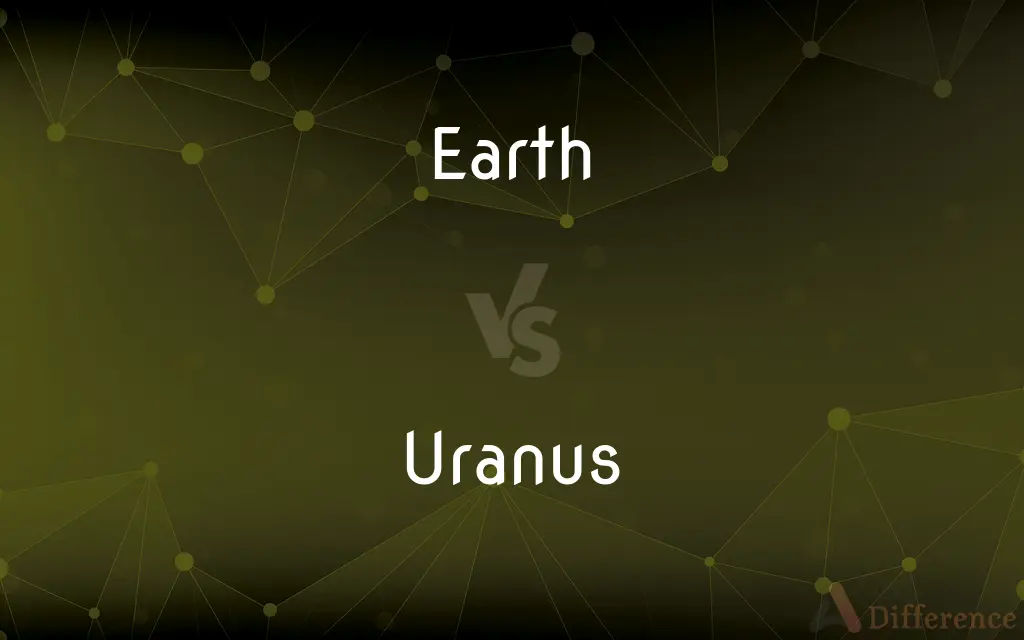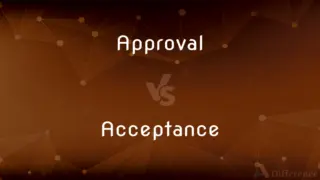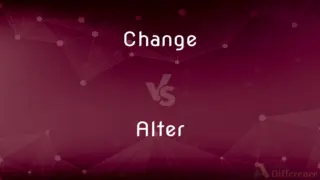Earth vs. Uranus — What's the Difference?
By Tayyaba Rehman — Published on August 23, 2023
Earth is our home planet with life and water, while Uranus is a distant gas giant with tilted rings.

Difference Between Earth and Uranus
Table of Contents
ADVERTISEMENT
Key Differences
Earth is the third planet from the sun and supports a diverse range of life. Uranus, on the other hand, is the seventh planet and does not have conditions favorable for life as we know it. While Earth's atmosphere consists primarily of nitrogen and oxygen, Uranus's atmosphere is made up largely of hydrogen, helium, and methane. This significant contrast in atmospheric composition affects their respective appearances; Earth has varied colors due to its geographical landscapes and water bodies, while Uranus exhibits a bluish-green hue due to methane absorption of red light.
Both Earth and Uranus have magnetic fields, but their origins and manifestations differ significantly. Earth's magnetic field, generated by its rotating iron core, helps protect life from harmful solar radiation. Uranus's magnetic field, however, is more peculiar; it doesn't emanate from its center and is tilted relative to its rotation axis.
A striking difference between Earth and Uranus is their respective rotation dynamics. Earth spins on its axis, completing one rotation roughly every 24 hours, giving us day and night. Uranus, uniquely, rotates on its side, possibly due to a past colossal impact. This means that parts of the planet can remain in daylight or darkness for long stretches of its orbit.
In terms of satellites and rings, Earth has one natural satellite, the Moon, which plays a crucial role in influencing our tides. Uranus, meanwhile, boasts 27 known moons and a system of narrow rings, largely composed of dark particles.
From a positional perspective in our solar system, Earth lies in the "habitable zone," often termed the "Goldilocks zone," where conditions are just right for liquid water and possibly life. Uranus, being farther from the sun, has temperatures plummeting to extremely cold levels, making it inhospitable for Earth-like life.
ADVERTISEMENT
Comparison Chart
Position in Solar System
Third planet from the Sun
Seventh planet from the Sun
Atmosphere
Primarily nitrogen and oxygen
Hydrogen, helium, and methane
Rotation Dynamics
Rotates upright with a 24-hour cycle
Rotates on its side
Satellites & Rings
One natural satellite (Moon)
27 moons and a system of rings
Potential for Life
Supports diverse life
Not favorable for known life forms
Compare with Definitions
Earth
The third planet from the sun.
Earth orbits the sun once every 365.25 days.
Uranus
The seventh planet from the sun.
Uranus is known for its bluish-green appearance.
Earth
Our home planet supporting life.
Humans have yet to find another place like Earth in the universe.
Uranus
A gas giant with a set of dark rings.
Few spacecraft have visited Uranus, and much remains to be learned about it.
Earth
The underground lair of a badger or fox.
Uranus
The planet with a unique sideways rotation.
A day on Uranus lasts about 17.24 hours.
Earth
The realm of mortal existence; the temporal world.
Uranus
Uranus is the seventh planet from the Sun. Its name is a reference to the Greek god of the sky, Uranus, who, according to Greek mythology, was the great-grandfather of Ares (Mars), grandfather of Zeus (Jupiter) and father of Cronus (Saturn).
Earth
Ground or soil.
She planted the seed deep in the earth.
Uranus
The son or husband of Gaia (Earth), and father of Chronos (Time) and the Titans.
Earth
The terrestrial world as opposed to the heavens.
Astronauts experience a unique view of Earth from space.
Uranus
A giant planet with a ring of ice particles; 7th from the sun
Earth
Everyday life; reality:was brought back to earth from his daydreams of wealth and fame.
Uranus
Named after the ancient Greek god of the sky.
In mythology, Uranus was the father of Cronus.
Earth
The substance of the land surface; soil
A layer of earth
Uranus
Greek Mythology The earliest supreme god, a personification of the sky, who was the son and consort of Gaea and the father of the Cyclopes and Titans.
Earth
The land surface of the world.
Uranus
The seventh planet from the sun, revolving about it every 84.01 years at a mean distance of approximately 2.9 billion kilometers (1.8 billion miles), having a mean equatorial diameter of 51,118 kilometers (31,763 miles) and a mass 14.6 times that of Earth.
Earth
To cover or heap (plants) with soil for protection.
Uranus
One of the primary planets. It is about 1,800,000,000 miles from the sun, about 36,000 miles in diameter, and its period of revolution round the sun is nearly 84 of our years.
Earth
A region of the planet; a land or country.
Uranus
(Greek mythology) god of the heavens; son and husband of Gaea and father of the Titans in ancient mythology
Earth
Worldly things, as against spiritual ones.
Uranus
A planet known for its extreme cold temperatures.
Temperatures on Uranus can drop to around -224°C.
Earth
(transitive) To hide, or cause to hide, in the earth; to chase into a burrow or den.
Earth
Any earthy-looking metallic oxide, as alumina, glucina, zirconia, yttria, and thoria.
Earth
The loose soft material that makes up a large part of the land surface;
They dug into the earth outside the church
Earth
Earth is the third planet from the Sun and the only astronomical object known to harbor and support life. About 29.2% of Earth's surface is land consisting of continents and islands.
Earth
The planet on which we live; the world
The diversity of life on earth
Earth
Electrical connection to the ground, regarded as having zero electrical potential.
Ensure metal fittings are electrically bonded to earth
Earth
Connect (an electrical device) with the ground
The front metal panels must be soundly earthed
Earth
Drive (a fox) to its underground lair.
Earth
Cover the root and lower stem of a plant with heaped-up earth
The stems can be earthed up when the plant is about one foot high
Earth
The softer, friable part of land; soil, especially productive soil.
Earth
The human inhabitants of the world:The earth received the news with joy.
Earth
Worldly affairs and pursuits.
Earth
The substance of the human body; clay.
Earth
The lair of a burrowing animal.
Earth
Chiefly British The ground of an electrical circuit.
Earth
(Chemistry)Any of several metallic oxides, such as alumina or zirconia, that are difficult to reduce and were formerly regarded as elements.
Earth
To chase (an animal) into an underground hiding place.
Earth
To burrow or hide in the ground. Used of a hunted animal.
Earth
(uncountable) Soil.
This is good earth for growing potatoes.
Earth
(uncountable) Any general rock-based material.
She sighed when the plane's wheels finally touched earth.
Earth
The ground, land (as opposed to the sky or sea).
Birds are of the sky, not of the earth.
Earth
The lair or den (as a hole in the ground) of an animal such as a fox.
Earth
(metonymically) The people on the globe.
Earth
Any planet similar to the Earth (our earth): an exoplanet viewed as another earth, or a potential one.
New space telescopes may accelerate the search for other earths that may be out there.
Earth
(archaic) The human body.
Earth
The aforementioned soil- or rock-based material, considered one of the four or five classical elements.
Earth
Any of certain substances now known to be oxides of metal, which were distinguished by being infusible, and by insolubility in water.
Earth
To connect electrically to the earth.
That noise is because the amplifier is not properly earthed.
Earth
(transitive) To bury.
Earth
(intransitive) To burrow.
Earth
The globe or planet which we inhabit; the world, in distinction from the sun, moon, or stars. Also, this world as the dwelling place of mortals, in distinction from the dwelling place of spirits.
That law preserves the earth a sphereAnd guides the planets in their course.
In heaven, or earth, or under earth, in hell.
Earth
The solid materials which make up the globe, in distinction from the air or water; the dry land.
God called the dry land earth.
He is pure air and fire, and the dull elements of earth and water never appear in him.
Earth
The softer inorganic matter composing part of the surface of the globe, in distinction from the firm rock; soil of all kinds, including gravel, clay, loam, and the like; sometimes, soil favorable to the growth of plants; the visible surface of the globe; the ground; as, loose earth; rich earth.
Give him a little earth for charity.
Earth
A part of this globe; a region; a country; land.
Would I had never trod this English earth.
Earth
A hole in the ground, where an animal hides himself; as, the earth of a fox.
They [ferrets] course the poor conies out of their earths.
Earth
The connection of any part an electric conductor with the ground; specif., the connection of a telegraph line with the ground through a fault or otherwise.
Earth
A plowing.
Such land as ye break up for barley to sow,Two earths at the least, ere ye sow it, bestow.
Earth
To hide, or cause to hide, in the earth; to chase into a burrow or den.
Earth
To cover with earth or mold; to inter; to bury; - sometimes with up.
The miser earths his treasure, and the thief,Watching the mole, half beggars him ere noon.
Why this in earthing up a carcass?
Earth
To burrow.
Earth
The 3rd planet from the sun; the planet on which we live;
The Earth moves around the sun
He sailed around the world
Earth
The solid part of the earth's surface;
The plane turned away from the sea and moved back over land
The earth shook for several minutes
He dropped the logs on the ground
Earth
The abode of mortals (as contrasted with heaven or hell);
It was hell on earth
Earth
Once thought to be one of four elements composing the universe (Empedocles)
Earth
The concerns of the world as distinguished from heaven and the afterlife;
They consider the church to be independent of the world
Earth
A connection between an electrical device and the earth (which is a zero voltage)
Earth
Hide in the earth like a hunted animal
Earth
Connect to the earth;
Earth the circuit
Earth
Electrical grounding or connection.
Make sure the appliance is properly earthed before use.
Earth
OftenEarthThe third planet from the sun, having a sidereal period of revolution about the sun of 365.26 days at a mean distance of approximately 149.6 million kilometers (92.96 million miles), a sidereal rotation period of 23 hours 56.07 minutes, an average radius of 6,378.1 kilometers (3,963 miles), and a mass of approximately 5.9736 × 1024 kilograms (1.3169 × 1025 pounds).
Earth
(British) A connection electrically to the earth (US ground); on equipment: a terminal connected in that manner.
Earth
The world of our current life (as opposed to heaven or an afterlife).
Earth
Worldly things, as opposed to spiritual things; the pursuits, interests, and allurements of this life.
Our weary souls by earth beguiled.
Earth
The people on the globe.
The whole earth was of one language.
Common Curiosities
Which planet is closer to the sun, Earth or Uranus?
Earth.
Do both Earth and Uranus have moons?
Yes, Earth has one moon, and Uranus has 27 known moons.
What is the primary color associated with Uranus?
Bluish-green.
Which planet supports a diverse range of life?
Earth.
What is the composition of Uranus's atmosphere?
Hydrogen, helium, and methane.
In what aspect does Earth's rotation differ from Uranus?
Earth rotates upright, while Uranus rotates on its side.
Does Uranus have any rings?
Yes, Uranus has a system of rings.
How many days does it take for Earth to orbit the sun?
Approximately 365.25 days.
What is the meaning of "earth" when referring to electrical devices?
It refers to electrical grounding or connection.
To which ancient figure does the name "Uranus" trace its origin?
The ancient Greek god of the sky.
Share Your Discovery

Previous Comparison
Approval vs. Acceptance
Next Comparison
Change vs. AlterAuthor Spotlight
Written by
Tayyaba RehmanTayyaba Rehman is a distinguished writer, currently serving as a primary contributor to askdifference.com. As a researcher in semantics and etymology, Tayyaba's passion for the complexity of languages and their distinctions has found a perfect home on the platform. Tayyaba delves into the intricacies of language, distinguishing between commonly confused words and phrases, thereby providing clarity for readers worldwide.
















































